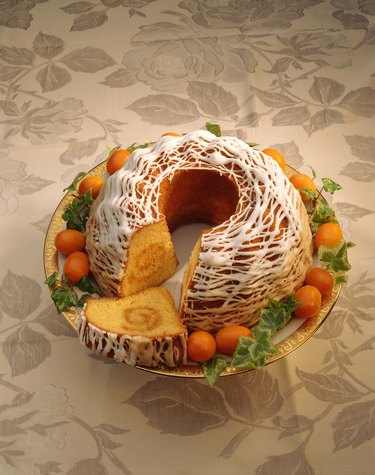Things You'll Need
Canned frosting
Glass measuring cup
Small saucepan
Spoon
Microwaveable bowl
Waxed paper
Milk or water
Icing knife

Standard cake icings are made with a combination of butter, powdered sugar, milk and flavorings. Called buttercream frostings, their flavors and colors can be changed with different extracts and artificial food coloring. Buttercream icings are also available premade and are generally sold in small resealable tubs in the baking section of the grocery store. Like homemade frosting, canned icing can be thinned to produce a glaze that can be spread more thinly or drizzled on cakes and other desserts. The glaze takes on a less fluffy consistency and produces a shinier icing that lends itself well to decorating with candies, nuts and small fruit.
Stove-top Instructions
Step 1
Remove the lid and inner liner from the can of frosting and spoon the contents out into a small saucepan.
Video of the Day
Step 2
Place the saucepan over low to medium heat and stir the frosting until it starts to thin, which should take about 2 to 3 minutes.
Step 3
Test for thinness by drizzling a small amount of the frosting off the end of a spoon onto waxed paper or a small dish.
Step 4
Add milk 1 drop at a time while stirring if the frosting still does not drizzle properly and repeat the waxed paper test.
Step 5
Remove the pan from the heat when the icing reaches the desired consistency and drizzle the icing immediately on the cooled cake, cookies or pastry.
Microwave Instructions
Step 1
Line the bottom of the microwave or turntable with a paper towel and remove the lid and inner liner from the container of frosting.
Step 2
Spoon about 1/3 cup of frosting into a microwaveable bowl and heat on "High" for 5 to 10 seconds. Increase the heating time to 10 to 20 seconds to microwave 2/3 cup of frosting.
Step 3
Stir the frosting and drizzle over the cake or pastry.
Tip
If adding food coloring to canned frosting before thinning, it's best to use the gel form of coloring sold in tubes, as liquid coloring may thin the frosting too much.
Warning
If heating the opened frosting can in a microwave, be sure it is microwave-safe and that there are no metal parts, such as aluminum foil from an inner seal, left on the rim. Microwaving aluminum foil creates flashing and may start a fire.
Use canned frostings labeled as "rich and creamy," and avoid any labeled "whipped."
Canned frosting thinned in a microwave may be too thin and sink into the surface of the cake after 24 hours if it is spread too thinly. Refrigerating the cake may prevent his by hardening the glaze more quickly.
Video of the Day